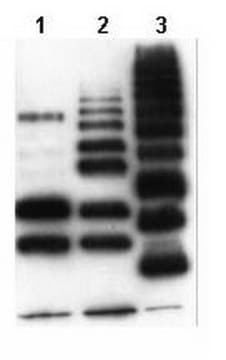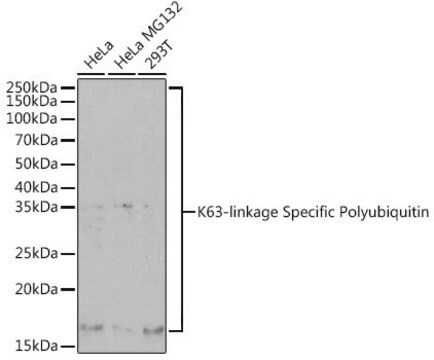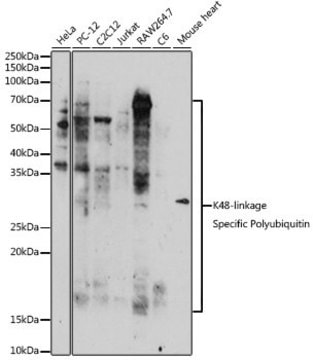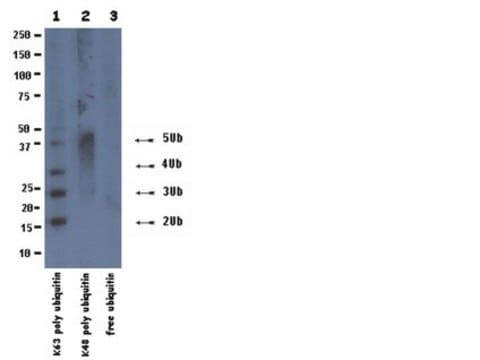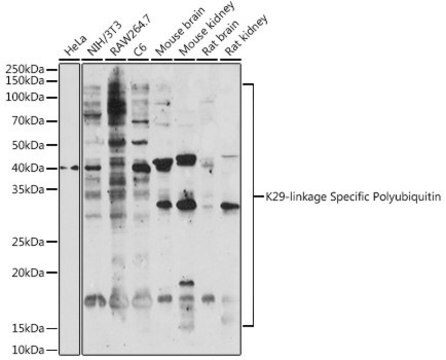05-1308
Anti-Ubiquitin Antibody, Lys63-Specific, clone Apu3, rabbit monoclonal
clone Apu3, from rabbit
Synonym(s):
Anti-Ubiquitin, Clone Apu3 Anti-Ubiquitin, Lys63-Specific Ubiquitin Antibody
About This Item
Recommended Products
biological source
rabbit
Quality Level
antibody form
purified antibody
antibody product type
primary antibodies
clone
Apu3, monoclonal
species reactivity
rat, human, mouse, rabbit
technique(s)
cell based assay: suitable
immunocytochemistry: suitable
immunohistochemistry: suitable
immunoprecipitation (IP): suitable
western blot: suitable
isotype
IgG
UniProt accession no.
shipped in
wet ice
target post-translational modification
unmodified
Gene Information
human ... UBAP2(55833)
General description
Di-Ubiquitin (Lys63-linked) Recombinant Protein (17-10388)
In contrast, polyubiquitin chains linked through the Lys48 residue of ubiquitin are most commonly associated with proteins targeted for proteosomal degradation.
Specificity
Immunogen
Application
Rabbit monoclonal anti-ubiquitin (Lys-63-specific), clone Apu3, precipitated ubiquitin-containing proteins from HeLa cell lysates
Immunohistochemistry:
Ubiquitin (Lys63-specific) staining of colorectal cancer tissue sections is restricted to tumor cells.
Flow cytometry:
Flow cytometry analysis of Jurkat cells using Anti-ubiquitin Lys63-specific (#05-1308) (blue) and rabbit IgG control (red).
Inhibition Assay:
Preincubation of anti-ubiquitin, Lys63-specific, with K63-multiubiquitin chains inhibited binding to HeLa cell lysate in Western blots.
Immunocytochemistry:
Ubiquitin (Lys63-specific) staining of colorectal cancer tissue sections is restricted to tumor cells. Positive staining was also detected in mouse, rat, and rabbit brain sections.
Signaling
Ubiquitin & Ubiquitin Metabolism
Quality
A 1:1000 dilution of this antibody detected Lys-63 ubiquitin chains by Western blotting, but did not detect free ubiquitin or Lys48 polyubiquitin chains.
Target description
Physical form
Storage and Stability
For maximum recovery of product, centrifuge the vial prior to removing the cap.
Analysis Note
Lys63 polyubiquitin chains.
Disclaimer
Not finding the right product?
Try our Product Selector Tool.
recommended
Storage Class Code
12 - Non Combustible Liquids
WGK
WGK 1
Flash Point(F)
Not applicable
Flash Point(C)
Not applicable
Certificates of Analysis (COA)
Search for Certificates of Analysis (COA) by entering the products Lot/Batch Number. Lot and Batch Numbers can be found on a product’s label following the words ‘Lot’ or ‘Batch’.
Already Own This Product?
Find documentation for the products that you have recently purchased in the Document Library.
Our team of scientists has experience in all areas of research including Life Science, Material Science, Chemical Synthesis, Chromatography, Analytical and many others.
Contact Technical Service
